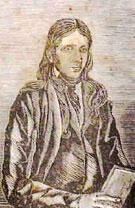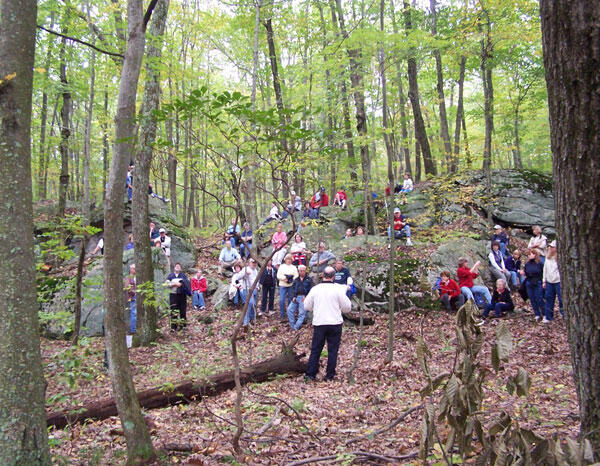by Hans DePold, town historian
(Published in the Bolton Community News, October 2004)
The very first New England camp meeting, which planted the seeds of the Methodist movement, was held right here in Bolton. The Bolton Land Trust has acquired some of the land where it took place.
The First Great Awakening begun by Jonathan Edwards focused on the heart and mind but died out when it ran into the Age of Enlightenment and the American Revolution. A period of revival beginning in 1795, with renewed interest in religion, spawned a new form of religious expression—the camp meeting. This revival was the precursor to the Second Great Awakening, which focused more on the heart and inspired a wave of social activism that gave rise to abolition groups and temperance campaigns, as well as efforts to reform prisons and care for the handicapped and mentally ill.
Camp meetings became the Woodstocks of the Great Awakening and were how evangelism and revivalism reached the sparsely settled areas of early America. These events were held in the open air and took place over several days because attendees had to travel many miles, camping in tents, covered wagons, and makeshift shelters of brush. They'd cook over open fires and attend the religious services throughout the morning, afternoon and evening.
People were asked to let go of their sins and rededicate themselves to God. It is believed that the first camp meeting was held at Red River, Kentucky, in June 1800. A much larger one was held at Cane Ridge, Kentucky, in August 1801, where between 10,000 and 25,000 people attended.
The first camp meeting in New England was held in Bolton for three days beginning June 30, 1805 in the southeastern area of our town near the Andover town line. The roads to the area were later abandoned and the site was all but forgotten. The famous Lorenzo Dow was the main speaker, and it was estimated that between 6,000 and 9,000 people camped in Bolton at a time when the total population of Bolton was under 2,000 people. Dow brought a warm-blooded account of other camp meetings in America.
There appeared to have been no lack of preachers and praying laborers, no lack of variety in the flood of fervent oratory each day, and no lack of exhortations, readings, testimonies of experiences, and the telling of anecdotes. Families and individuals throughout the area would travel to camp together and meet for worship and fellowship. Later there were camp meetings in the northwest of Bolton in 1836, 1838 and 1847, which resulted in the road there being named Camp Meeting Road.
Lorenzo Dow was born on October 16, 1777 in Coventry, Connecticut, where he was educated in a one-room schoolhouse. He died in Washington, D.C., in 1834. His wife Peggy, to whom he was married in 1804, was his constant traveling companion. She died in Hebron, Connecticut, on January 6, 1820.
 Reverend Dow began his ministry at age 18. When he came to Bolton in 1805 he was 28 and at the height of his fame. His early religious convictions led him to embrace the doctrines of the Methodists. In 1798 the Connecticut Conference received him. In 1799 they sent him to Cambridge, New York, and after a few months to Pittsfield, Massachusetts, and from there to Essex, Vermont, all within one year. He desired no permanent assignment but preferred to travel as Christ's disciples had been instructed to spread the Gospel.
Reverend Dow began his ministry at age 18. When he came to Bolton in 1805 he was 28 and at the height of his fame. His early religious convictions led him to embrace the doctrines of the Methodists. In 1798 the Connecticut Conference received him. In 1799 they sent him to Cambridge, New York, and after a few months to Pittsfield, Massachusetts, and from there to Essex, Vermont, all within one year. He desired no permanent assignment but preferred to travel as Christ's disciples had been instructed to spread the Gospel.
Lorenzo Dow became a well-known preacher who, in his lifetime, traveled to all 17 of the states of the union as well as Canada, England, Wales, and Ireland. He probably spoke the Gospel to more persons than any other individual until Billy Graham. He was one of the most remarkable men of his age for his zeal and energy in the cause of God. His eccentric dress, style of preaching, and fearless behavior attracted great attention, while his understanding of human character gave him considerable influence over the multitudes who attended his services. While he never had a permanent church or followers, there were few who doubted his true religion or good intentions.
He was restless and he was a dreamer. He was contradictory and never happier than when engaged in a war of words. His features were both rough and delicate but in that face there was every mark of indomitable energy. He parted his hair in the middle and wore it hanging down to his shoulders. His face was radiant with kindness. His wife Peggy described her first meeting with him: "He is a most singular character, and admits himself that he was known by the name of 'Crazy Dow' and called himself 'Son of Thunder.'"
She also described their life on the road: "At night we camped out in lonely deserts, uninhabited by any being except wild beasts and savages. ... I was much alarmed and uneasy, but my husband was content and slept sweetly."
